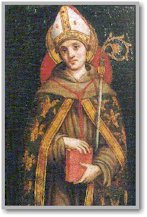-
 ST.
BONAVENTURE ST.
BONAVENTURE
-
Feast day: July
15
-
Bishop and Doctor
-
-
-
St. Bonaventure,
known as "the Seraphic Doctor," was born at Bagnorea in Tuscany,
in 1221. He received the name of Bonaventure in consequence of an
exclamation of St. Francis of Assisi, when, in response to the
pleading of the child's mother, the saint prayed for John's
recovery from a dangerous illness, and, foreseeing the future
greatness of the little John, cried out "O Buona ventura"- O good
fortune!
-
-
At the age of
twenty-two, St. Bonaventure entered the Franciscan Order.
Having made his vows, he was sent to Paris to complete his
studies under the celebrated doctor Alexander of Hales, an
Englishman and a Franciscan. After the latter's death, he
continued his course under his successor, John of Rochelle. In
Paris, he became the intimate friend of the great St. Thomas
Aquinas. He received the degree of Doctor, together with St.
Thomas Aquinas, ceding to his friend against the latter's
inclination, the honor of having it first conferred upon him.
Like St. Thomas Aquinas, he enjoyed the friendship of the holy
King, St. Louis.
-
-
At the age of
thirty-five, he was chosen General of his Order and restored a
perfect calm where peace had been disturbed by internal
dissensions. He did much for his Order and composed “The Life of
St. Francis.” He also assisted at the translation of the relics
of St. Anthony of Padua. He was nominated Archbishop of York
by Pope Clement IV, but he begged not to be forced to accept that
dignity. Gregory X obliged him to take upon himself a greater
one, that of Cardinal and Bishop of Albano, one of the six
suffragan Sees of Rome. Before his death, he abdicated his office
of General of the Franciscan Order. He died while he was
assisting at the Second Council of Lyons, on July 15, 1274.
-
-
Bonaventure was
the true heir and follower of Alexander of Hales and the
continuator of the old Franciscan school founded by the Doctor
Irrefragabilis, but he surpassed the latter in acumen, fertility
of imagination, and originality of expression. His proper place
is beside his friend St. Thomas, as they are the two greatest
theologians of Scholasticism. If it be true that the system of
St. Thomas is more finished than that of Bonaventure, it should be
borne in mind that, whereas Thomas was free to give himself to
study to the end of his days, Bonaventure had not yet received the
Doctor's degree when he was called to govern his order and
overwhelmed with multifarious cares in consequence. The heavy
responsibilities which he bore till within a few weeks of his
death were almost incompatible with further study and even
precluded his completing what he had begun before his thirty-sixth
year. Again, in attempting to make a comparison between
Bonaventure and St. Thomas, we should remember that the two saints
were of a different bent of mind; each had qualities in which he
excelled; one was in a sense the complement of the other; one
supplied what the other lacked.
-
-
Thus Thomas was
analytical, Bonaventure synthetical; Thomas was the Christian
Aristotle, Bonaventure the true disciple of Augustine; Thomas was
the teacher of the schools, Bonaventure of practical life; Thomas
enlightened the mind, Bonaventure inflamed the heart; Thomas
extended the Kingdom of God by the love of theology, Bonaventure
by the theology of love. Even those who hold that Bonaventure
does not reach the level of St. Thomas in the sphere of Scholastic
speculation concede that as a mystic, he far surpasses the Angelic
Doctor. In this particular realm of theology, Bonaventure equals,
if he does not excel, St. Bernard himself. To the minds of his
contemporaries impregnated with the mysticism of the Middle Ages,
the spirit that breathed in Bonaventure's writings seemed to find
its parallel only in the lives of those that stand nearest to the
Throne, and the title of "Seraphic Doctor" bestowed upon
Bonaventure is an undeniable tribute to his all-absorbing love for
God. This title seems to have been first given to him in 1333 in
the Prologue of the "Pantheologia" by Raynor of Pisa, O.P.
He had already received while teaching in Paris the name of
Doctor Devotus.
-
|
